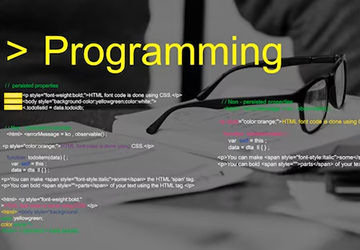Python doesn't just top the charts among Popular Programming Languages; it's a community-driven phenomenon. Python has seen a meteoric rise in community contributions, with extensive libraries and frameworks covering anything from web scraping to neural networks. The language has been future-proofed, ensuring its adaptability aligns with the Future of Programming. It makes Python not just popular but exceedingly versatile. For anyone looking to break into the tech scene or for companies aiming to scale their operations, Python stands as one of the Best Coding Languages. Its simplicity allows for quick learning curves and rapid prototyping, making it user-friendly and business-friendly.

While JavaScript is the kingpin of web development, its capabilities extend far beyond that. Its evolution has included the creation of frameworks and libraries that allow for back-end development, mobile app creation, and even game development. The language has evolved into a full-stack development tool, a remarkable journey that cements its place in the Future of Programming. JavaScript's adaptability and vast range of use cases make it more than just popular; they make it indispensable. When it comes to Best Coding Languages, JavaScript is a multifaceted gem that offers solutions for a variety of needs.
Rust may have a shorter history than some other languages, but what it needs in age more than makes up for its capability. Its focus on memory safety without performance compromise is revolutionary in a world where data breaches and cyber-attacks are commonplace. Rust's community-driven design process allows it to evolve rapidly, keeping it at the forefront of innovation and thus aligning with the Future of Programming. Rust is one of the Best Coding Languages for companies prioritising speed and security, especially for system-level programming tasks requiring impeccable security measures.
In today's cloud-centric world, Go has proven to be a strong contender among Popular Programming Languages. Developed by Google, its simplicity is its most vital asset, allowing for easy code maintenance and rapid development. The language is specifically designed for scalability and efficiency, two key pillars of cloud computing. Businesses looking to optimise their cloud-based operations have much to gain by investing in Go, marking its role in the Future of Programming and solidifying its place among the Best Coding Languages for modern business solutions.
Since Google announced its support for Kotlin, the language has grown exponentially, especially in Android development. It successfully addresses many of the issues developers found in Java, offering more concise code and robust safety features specifically designed to reduce the dreaded null pointer exceptions. As mobile experiences become more integral to business and daily life, Kotlin's importance cannot be overstated. It offers an optimised route to high-quality mobile applications, aligning with the Future of Programming and setting itself apart as one of the Best Coding Languages for mobile development.
Python has made substantial strides in machine learning and data science. Its libraries, such as TensorFlow, PyTorch, and Scikit-learn, offer extensive functionalities. These libraries have been crucial in making Python one of the Popular Programming Languages for developing algorithms in artificial intelligence. The language's simple syntax allows for quicker coding, and its vast ecosystem provides tools to handle large datasets. As a result, Python remains a powerful tool in big data analytics, placing it in the spotlight as one of the Best Coding Languages for specialised tasks in this field.
With the introduction of WebRTC protocols, JavaScript has solidified its place as a go-to language for real-time web applications. Video conferencing, peer-to-peer file sharing, and live auctions are examples of the real-time capabilities provided by JavaScript. WebRTC offers a platform-independent framework, which has helped JavaScript position itself prominently among the popular programming languages for real-time Internet communication. When considering the Future of Programming, JavaScript will undoubtedly continue to evolve to meet the real-time demands of the modern web.

Rust is renowned for its focus on memory safety without sacrificing performance. Its low-level capabilities make it an excellent choice for system programming, particularly for operating and embedded systems in IoT devices. Its attention to detail regarding system resource management projects it as one of the programming languages of the Future of Programming. With a syntax that emphasises safe memory usage, Rust stands out among system-level languages for the unique capabilities it brings to the table.
Originally developed at Google, Go, often known as Golang, has become a preferred language for cloud infrastructure and DevOps. Its robust standard library and uncomplicated syntax make it well-suited for server-side development. The language has been used to develop Kubernetes, Docker, and other cloud-native technologies, making it one of the most popular programming languages for cloud computing. Its efficiency and speed in building scalable and high-performance systems make it a strong contender in the Best Coding Languages category for cloud-based solutions.
Kotlin has significantly impacted mobile development by providing a type-safe, concise language fully interoperable with Java. Kotlin Multiplatform, an experimental feature, allows for sharing code across different platforms, notably iOS and Android. It has accelerated the mobile app development cycle and reduced the resources required.
In this ever-evolving technological landscape, programming languages are pivotal in shaping the Future of Programming. Each language serves a unique purpose, from Python's unrivalled utilities in data science to JavaScript's adaptability for real-time applications. Rust's focus on memory safety makes it a game-changer in systems programming, whereas Go's efficiency gives it an edge in cloud infrastructure. Lastly, Kotlin's progressive approach to cross-platform mobile development solidifies its place among the Best Coding Languages.